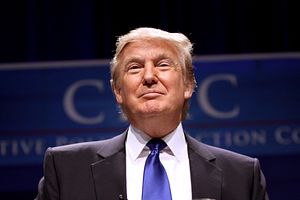My grandfather Josef, having been in a camp during the war, considered buttered bread a luxury — so much so that it was his favorite dessert. Indeed, none was wasted. He would take a bad loaf, cut away the mold and casually reach for the butter tray. When I read Gogol’s Dead Souls and the bereaved Plyushkin tells a servant to scrape the mold off a cake before serving it, I pictured Josef performing surgery with a butter knife.
Dispossession teaches us to make more of less. It also makes us overprotective of what little we do have, which is why Russians refer to compulsive hoarders as having “Plyushkin syndrome,” understanding deprivation is a common cause. The Chinese, having won purchase in the world through great suffering, can demonstrate both sides of the coin: both famously pragmatic and, at times, fiercely nationalistic.
It’s therefore bizarre that President-elect Donald Trump took a congratulatory call from Taiwanese President Tsai Ing-wen on December 2, then questioned the “one China” policy. Such moves represent a misreading of the psychology of dispossession, which in China’s case stems from the “century of humiliation.” Trump should understand this; after all, he won the election thanks to the support of working-class whites, whose sense of dispossession drove them to vote for him even though many of them find his behavior repugnant.
In terms of civility and tolerance, Trump’s opponent, Hillary Clinton, had what the Christian right calls a moral majority, but she lost the election.
The calculation Trump used to win mirrors the U.S. position on the one China policy — realism bests morality. In terms of human rights, Taiwan has the moral high ground. But China has the world’s largest population (1.4 billion), second largest GDP ($11.4 trillion), and largest active military (2.3 million). The future of the Asia-Pacific belongs not to the capitalist titans of Taipei but to the bureaucrats of Beijing.
Though the winning strategy would be maintaining ties with China, if we “resolve our hearts to win with honor,” as the poet Torquato Tasso put it, we would seek to do that without leaving Taiwan out in the cold. But picking a fight with China while trying to hold influence in the region will almost surely prove to be defeating. Besides, if the president-elect is trying to bait the great white shark of the South China Sea, he shouldn’t chum the waters with the people of Taiwan.
The final thing to consider is the extent to which China is willing to go over the Taiwan issue, and whether we’re willing to match that. China responded to Trump’s phone call with Tsai by flying a nuclear bomber around Taiwan. Is this saber-rattling or is Beijing locking and loading? On January 8, Senator Ted Cruz met with Tsai in Houston. That same day, Global Times published an op-ed that said if Trump walks away from the one China policy, “the mainland is fully prepared … the Chinese people will demand the government to take revenge. There is no room for bargaining.”
If Beijing has to square off with a foreign power over Taiwan, the Communist Party might make a move toward outright annexation, and the Taiwanese will suffer most of all. It would help if Trump had some measure of understanding of the psychology of dispossession to help him gauge the potential Chinese response, but I fear that’s something he knows nothing about.

































